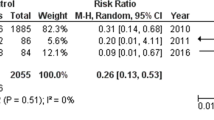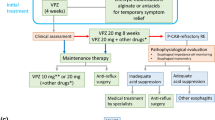Abstract
Background
Few studies have explored the satisfaction with proton pump inhibitors (PPIs) for gastroesophageal reflux disease (GERD).
Aim
The aim of this study was to assess patient and physician satisfaction with currently prescribed PPIs for patients with GERD.
Methods
Separate online surveys were completed by 1,002 physicians and 1,013 GERD patients. Physician surveys examined satisfaction, symptom relief, long-term therapy, side-effects, breakthrough symptoms, and use of supplemental medications with PPIs. Patient surveys evaluated PPI regimen, length of therapy, satisfaction with PPI, symptom relief, use of supplemental medications, and perceptions about long-term use and side-effects.
Results
Most respondents were satisfied with PPI therapy, but 35.4% of GERD patients and 34.8% of physicians perceived patients as “somewhat satisfied” to “completely dissatisfied” with PPI therapy. Patients who were highly satisfied were more likely to indicate complete symptom relief (P < 0.001) relative to patients who were less satisfied. However, over 35% of patients on once-daily and 54% on twice-daily PPI indicated that therapy failed to completely relieve symptoms. Patients who were highly satisfied were more likely to recommend medication to patients with the same symptoms (P < 0.001) and less likely to report that the medication is too expensive (P < 0.001), worry about long-term use (P < 0.001), or add OTC medications for supplemental control (P < 0.004).
Conclusions
Approximately one-third of GERD patients reported persistent symptoms and were dissatisfied with PPI therapy.





Similar content being viewed by others
Notes
PCP categorization included general practitioners, family practitioners, internal medicine practitioners, and osteopathic practitioners.
References
Sandler RS, Everhart JE, Donowitz M, et al. The burden of selected digestive diseases in the United States. Gastroenterology. 2002;122:1500–1511.
Armstrong D. Systematic review: persistence and severity in gastroesophageal reflux disease. Aliment Pharmacol Ther. 2008;28:841–853.
Vakil N. Review article: New pharmacological agents for the treatment of gastro-oesophageal reflux disease. Aliment Pharmacol Ther. 2004;19:1041–1049.
Calabrese C, Fabbri A, Di Febo G. Long-term management of GERD in the elderly with pantoprazole. Clin Intery Aging. 2007;2:85–92.
Pettit M. Treatment of gastroesophageal reflux disease. Pharm World Sci. 2005;27:432–435.
Becker V, Bajbouj M, Waller K, Schmid RM, Meining A. Clinical trial: persistent gastro-oesophageal reflux symptoms despite standard therapy with proton pump inhibitors—a follow-up study of intraluminal-impedance guided therapy. Aliment Pharmacol Ther. 2007;26:1355–1360.
National Digestive Diseases Information Clearinghouse (NDDIC): Heartburn, gastroesophageal reflux (GER), and gastroesophageal reflux disease (GERD). Available at: http://digestive.niddk.nih.gov/ddiseases/pubs/gerd/. Accessed Aug 28, 2008.
Liker H, Hungin P, Wiklund I. Managing gastroesophageal reflux disease in primary care: the patient perspective. J Am Board Fam Pract. 2005;18:393–400.
Bretagne JF, Honnohat C, Richard-Mollard B, Caekkaerts A, Barthelemys P. Comparative study of characteristics and disease management between subjects with frequent and occasional gastro-oesophageal reflux symptoms. Aliment Pharmacol Ther. 2006;23:607–616.
Kulig M, Leodolter A, Vieth M, et al. Quality of life in relation to symptoms in patients with gastro-oesophageal reflux disease—an analysis based on the ProGERD initiative. Aliment Pharmacol Ther. 2003;18:767–776.
Wahlqvist P, Karlsson M, Johnson D, Carlsson J, Bolge SC, Wallander MA. Relationship between symptom load of gastro-esophageal reflux disease and health-related quality of life, work productivity, resource utilization and concomitant diseases: survey of a US cohort. Aliment Pharmacol Ther. 2008;27:960–970.
Crawley JA, Schmitt CM. How satisfied are chronic heartburn sufferers with their prescription medications? Results of the patient unmet needs survey. J Clin Outcomes Manag. 2000;7:29–34.
Donnellan C, Sharma N, Preston C, Moayyedi P. Medical treatments for the maintenance therapy of reflux oesophagitis and endoscopic negative reflux disease. Cochrane Database Syst Rev. 2004;2:CD003245.
Robinson M, Shaw K. Proton pump inhibitor attitudes and usage: a patient survey. Pharm Ther. 2002;27:202–206.
Hatlebakk JG, Katz PO, Camacho-Lobato L, Castell DO. Proton pump inhibitors: better acid suppression when taken before a meal than without a meal. Aliment Pharmacol Ther. 2000;14:1267–1272.
Hunt R, Yuan Y, Yaghoobi M. GERD: new strategies and new failures. J Clin Gastroenterol. 2007;41(Supp 2):S72–S80.
Mainie I, Tutuian R, Shay S, et al. Acid and non-acid reflux in patients with persistent symptoms despite acid suppressive therapy: a multicentre study using combined ambulatory impedance-pH monitoring. Gut. 2006;55:1398–1402.
Rubenstein JH, Nojkov B, Korsnes S, et al. Esophageal hypersensitivity is associated with features of psychiatric disorders and the irritable bowel syndrome. Aliment Pharmacol Ther. 2007;26:443–452.
Nojkov B, Saad R, Adlis S, Shaw M, Chey WD. Predictors of response to PPI therapy in patients with GERD: the influence of co-morbid IBS and psychological disease. Aliment Pharmacol Ther. 2008;27:473–482.
Acknowledgments
The authors wish to recognize the writing assistance provided by Meg Franklin, PharmD, PhD, an associate with Xcenda, L.L.C.
Disclosures
Financial Support: The study was funded by Takeda Pharmaceuticals North America, Inc.
Author information
Authors and Affiliations
Corresponding author
Rights and permissions
About this article
Cite this article
Chey, W.D., Mody, R.R. & Izat, E. Patient and Physician Satisfaction with Proton Pump Inhibitors (PPIs): Are There Opportunities for Improvement?. Dig Dis Sci 55, 3415–3422 (2010). https://doi.org/10.1007/s10620-010-1209-2
Received:
Accepted:
Published:
Issue Date:
DOI: https://doi.org/10.1007/s10620-010-1209-2




